How to replace a lawn mower ignition coil on an OHV engine
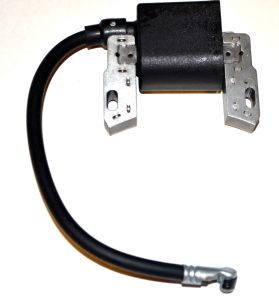
This lawn mower repair guide has step-by-step instructions for how to replace the ignition coil on a lawn mower with an overhead valve (OHV) engine. The ignition coil sends current to the spark plug to ignite the fuel in the cylinder. A failed ignition coil is one reason a lawn mower won’t start. You can determine if the ignition coil is the problem by following the troubleshooting steps in Lawn Mower Won't Start Troubleshooting Video: Spark and Ignition Problems.
If the ignition coil doesn't send electric current to the spark plug when you pull the starter rope, replace the coil with the manufacturer-approved lawn mower part.
This repair guide and video shows how the replace the ignition coil on common Briggs & Stratton OHV engines that power Craftsman, Husqvarna, Poulan, Troybilt, MTD, Toro, Cub Cadet and Ariens walk-behind lawn mowers.
If your lawn mower is an older model with a flathead engine, see How to Replace a Lawn Mower Ignition Coil on a Flathead Engine.
This video explains how to replace the ignition coil on a walk-behind lawn mower with an OHV engine.
Instructions
- 01.
Disconnect the spark plug wire
Disconnect the spark plug wire from the spark plug.
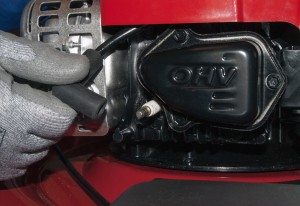
PHOTO: Disconnect the spark plug.
- 02.
Remove the blower housing
Release the starter rope from the mower handle.
Remove the screws from the blower housing.
Pull the blower housing off the engine.
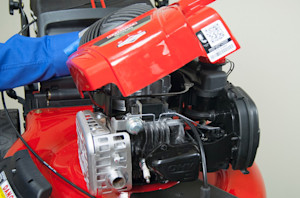
PHOTO: Remove the blower housing.
- 03.
Remove the ignition coil
Rotate the flywheel to position the flywheel magnets away from the ignition coil.
Disconnect the stop wire.
Remove the ignition coil mounting screws.
Pull the ignition coil off the engine.
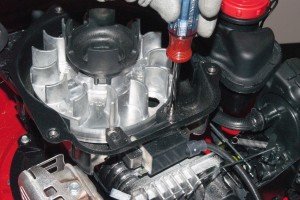
PHOTO: Remove the ignition coil screws.
- 04.
Install the new ignition coil
Position the new ignition coil on the mounting posts and line up the mounting screw holes.
Loosely reinstall the ignition coil mounting screws.
Pull the ignition coil as far away from the flywheel as possible then tighten the mounting screws.
Insert the 0.010-inch feeler gauge leaf between the coil arms and the flywheel.
Rotate the flywheel to position the flywheel magnets in front of the ignition coil.
Loosen the ignition coil mounting screws and allow the magnets to pull the ignition coil against the feeler gauge leaf.
Tighten the mounting screws and work the feeler gauge leaf out of the ignition coil air gap.
Connect the stop wire to the new ignition coil.
Tip: Use a business card instead of a feeler gauge leaf to set the ignition coil air gap—it’s about the same width.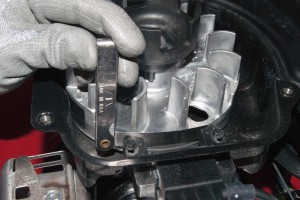
PHOTO: Set the ignition coil air gap.
- 05.
Reinstall the blower housing
Position the blower housing on the top of the engine and line up the mounting holes.
Reinstall the mounting screws.
Reconnect the starter rope to the mower handle.
- 06.
Reconnect the spark plug wire
Connect the spark plug wire to the spark plug.
Symptoms for gas walk-behind mowers
Choose a symptom to see related walk-behind mower repairs.
Main causes: damaged cutting blade, loose cutting blade, damaged flywheel key, engine needs tune up…
Main causes: uneven wheel height settings, damaged wheel, dull or damaged cutting blade…
Main causes: engine needs tune up, dirty or clogged carburetor, damaged flywheel key…
Main causes: drive control cable failure, worn or broken drive belt, bad transmission, broken drive wheel…
Main causes: stale gas, engine needs tune up, bad spark plug, dead battery, bad recoil starter, faulty safety switch, ba…
Main causes: dirty carburetor, bad spark plug, clogged air filter, engine choke problems, clogged gas cap vent…
Repair guides for gas walk-behind mowers
These step-by-step repair guides will help you safely fix what’s broken on your walk-behind lawn mower.
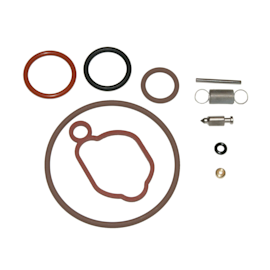
How to rebuild a lawn mower carburetor
The carburetor mixes air with fuel to drive the piston. Rebuild the carburetor if it's clogged or leaks.…
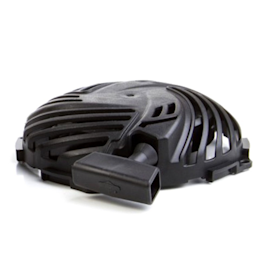
How to replace a lawn mower recoil starter on an OHV engine
Replace the recoil starter if it doesn't move when you pull the starter rope.…

How to replace a lawn mower wheel
Learn how replace a damaged wheel on a walk-behind lawn mower—it's a quick, easy fix.…
Effective articles & videos to help repair your walk-behind mowers
Use the advice and tips in these articles and videos to get the most out of your walk-behind lawn mower.

Learn about all the convenient features on our Sears PartsDirect website that make your parts purchases easier.…
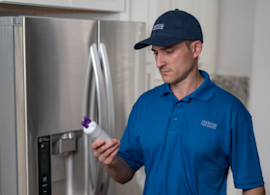
Get answers to frequently asked questions about Sears and Sears PartsDirect.…

Learn about the different kinds of mower blades and how to maintain them.…